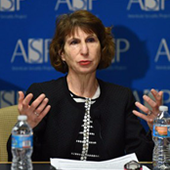Oxfam in 2002 issued a devastating report describing how the world trade system has failed the world's poor. Ever since, the NGO and its allies have urged policymakers to rethink their trade strategies. Oxfam may find an ally in Robert Zoellick, who has just been nominated to serve as World Bank president. Few development advocates perceive Zoellick as a man committed to making trade fairer for the world's poor. But he has long tried to realign U.S. trade policies to meet development objectives.
Policymakers first promised such policy coherence in 2000, when leaders of 191 nations agreed to the Millennium Development Goals. These officials not only promised to cut poverty in half, but they also agreed to improve health, promote gender equality, and increase access to education for citizens of the world's poorest nations. And they acknowledged that they had to change the way they made policy to effectively reduce poverty. As a result, these officials agreed to coordinate their development and trade policies at the national and international levels.
But the Millennium Development Goals were, to a large degree, pretty words. The leaders were not obligated to meet the targets delineated in the declaration. Most governments have no strategy or institutional structure to ensure consistency between their trade and developmental goals. With the exception of the Swedish, Dutch, and Danish governments, few states have formulated a coherent trade agenda that serves development ends. Policymakers generally act as if trade policy is simply commercial policy. These officials may weigh international political or security concerns, but they devise trade policy to meet the demands of organized constituents, rather than the needs of humankind.
Zoellick's tenure as U.S. Trade Representative is a story of how hard it is to make trade and development policies mutually reinforcing. Zoellick tried to partner with then EU Trade Commissioner Pascal Lamy to prod such a rethinking. In July 2001, the two men wrote in the Washington Post, "Trade policy must…make a material difference to the poorest of the world's populations." They stressed that the World Bank must do a better job "building developing country capacity" to implement trade rules, which often require these countries to make expensive and difficult governance choices. They warned that if industrialized countries didn't provide greater market access for developing country goods and services, "we shut their doors on their future," hinting it was our future as well. But few industrialized country policymakers were willing to press for a round centered on the needs of the poor unless their constituents could see immediate benefits.
The 9/11 terrorist attacks gave Zoellick and others an opportunity to prod countries to truly center the new round on the needs of developing countries and the poor. Zoellick showed flexibility and courage as he used U.S. concessions to get other countries to make equivalent compromises. But his diplomatic skills contrasted with his political tin ear. First, he recast trade policy as a second front in the war on terror. He then alienated many members of Congress when he hinted that he saw social and environmental concerns as red herrings. Not surprisingly, many members of Congress balked at his Doha Round agenda. Under his watch, U.S. agricultural subsidies actually increased, infuriating development advocates and developing country trade policymakers. He was forced to defend America's commitment to development by emphasizing trade capacity building, rather than by the market access concessions he had envisioned.
That was not the only lesson Zoellick learned at the helm of U.S. trade policy. He argued that the United States should "create a new competition in liberalization, target the needs of developing countries, and create a fresh political dynamic." But this strategy did not play out as he forecasted. Competitive trade liberalization has undermined the WTO, alienated many developing country policymakers, and forced many countries to allocate scarce resources to bilateral negotiations.
But under Zoellick's watch, Congress approved several free trade agreements that changed the structure and process of how these governments made trade policy. The agreements required countries such as Guatemala, Morocco, and Bahrain to increase political participation, ensure public comment and due process rights, and increase the transparency of their trade policymaking. These strategies increased the likelihood that the needs of their poorest citizens will be heard.
This history suggests Zoellick will manage the World Bank to facilitate greater coherence between trade and development policies. He should push loan recipients to integrate their trade reform programs into a broader national strategy for poverty reduction. He should work with his friend Lamy, now WTO head, to research how to provide incentives to countries that align their trade and development strategies. He should press rich country policymakers to consider how their trade strategies affect humankind in the areas of access to food, water, credit, education, and other resources.
Zoellick clearly wants trade rules to work for the world's poor. As World Bank president, he will be better positioned to right the trade-development imbalance.
Susan Ariel Aaronson teaches in the George Washington University School of Business and is the author (with Jamie Zimmerman) of Trade Imbalance: The Struggle to Weigh Human Rights in Trade Policymaking (Cambridge University Press: July 2007).




